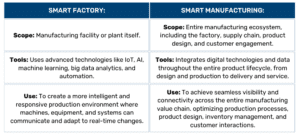Smart factories, a.k.a. Industry 4.0, use advanced technologies like the Internet of Things (IoT), AI, and robotics to optimize manufacturing processes. To keep up in this evolving landscape, employers must recruit the right talents with a strong emphasis on emerging skills. Here’s how smart factories are influencing the role of hiring engineers:
- Smart Factory vs. Smart Manufacturing: Smart factory and Smart manufacturing are two common terms used in the rise of Industry 4.0. Although common, it is important to note their difference in order to understand their impact in hiring engineers.
- Increased use of Smart Factories
- This 2023, manufacturers’ key priorities include profit growth and cost reduction. Smart manufacturing, with the help of Industry 4.0 technologies, is driving faster, safer, more efficient, and more profitable manufacturing processes across diverse industries. Around 71% of manufacturers are integrating autonomous technologies such as robotics, AGVs, and AMRs into their smart factory strategies. In addition, 86% of manufacturing leaders see smart manufacturing as a crucial part of their digital supply chain strategy.
- Example: General Electric, Siemens, and Bosch are a few examples of electric, automation, and engineering companies, that have all embraced Industry 4.0 to establish Smart Factories.
- This 2023, manufacturers’ key priorities include profit growth and cost reduction. Smart manufacturing, with the help of Industry 4.0 technologies, is driving faster, safer, more efficient, and more profitable manufacturing processes across diverse industries. Around 71% of manufacturers are integrating autonomous technologies such as robotics, AGVs, and AMRs into their smart factory strategies. In addition, 86% of manufacturing leaders see smart manufacturing as a crucial part of their digital supply chain strategy.
- Challenges In Employment: A smart factory may bring innovative efficiency and flexibility to a supply chain, but it also demands substantial investments to enhance how people, processes, and technologies operate. Here are smart factory’s challenges in the areas of employment:
- Lack of change management
- Even though 83% of manufacturing leaders recognize the importance of investing in smart manufacturing, there’s uncertainty about whether most of them grasp the magnitude of change needed both in technology and talent. Companies should avoid rapidly scaling up their smart factories to prevent extended periods of downtime on new technology training and transitions.
- Lack of skilled workers and leaders
- The BLS has forecasted a 6% decline in manufacturing jobs across the country from 2016 to 2026. While the number of traditional production roles is expected to decrease, there will be growth in several positions that support modern automated factories.
- However, 57% of manufacturing leaders express concerns about their companies lacking skilled workers to support digitization plans. Manufacturers across the states also share similar worries over finding managers and decision-makers with the needed skills and knowledge.
- Newer workers may be tech-savvy but lack applied practices, while older employees may have the knowledge but lack digital skills. Workers require a combination of both to excel in a smart manufacturing environment. Factory employees also need technical and analytical skills to use algorithms to monitor trends and productivity in increasingly interconnected factories.
- Lack of change management
What is Smart Factory’s Effect on Engineering Employment?
A study predicts an increase in US employment within engineering positions in the manufacturing sector. Here’s the table for the 10-year employment projection for mechanical, electrical, and industrial engineers, along with engineering managers:
Gartner highlights the importance of advancing factory workers alongside technology to ensure the success of the changes in smart factory adaptation. Here are some important areas to consider in engineering hiring:
- Training/Upskilling: Companies should assess the need to retrain existing employees on new systems, tools, and processes while also considering the recruitment of fresh talent to expedite operational improvements. On the other hand, engineers will need to upskill to truly embrace the modern changes brought by digitalization.
- Skills Needed: A recent report predicted shifts in the manufacturing workforce, with a reduction in low-skilled assembly roles and an increased demand for workers with computer, technical, and data management skills. As factories become more connected, manufacturers will need workers with skills and experience in handling large amounts of data, operating autonomous systems, using 3-D simulations, augmented reality, and additive manufacturing to improve decision-making.
- Business strategy: Manufacturers should align their strategies with smart manufacturing for sustainable growth and competitiveness. This entails cultivating a culture of continuous learning, investing in training and digital skill development, and adopting advanced digital tools such as data analytics platforms, IoT sensors, and automation systems. Moreover, coordinating activities to enable capabilities, empower employees, and enhance the work experience can significantly boost engagement and create an appealing environment for experienced employees.
Utilize SoloPoint Solution’s services to find highly skilled engineers who are prepared to enhance your manufacturing processes and seamlessly guide you through the transition to Industry 4.0.


